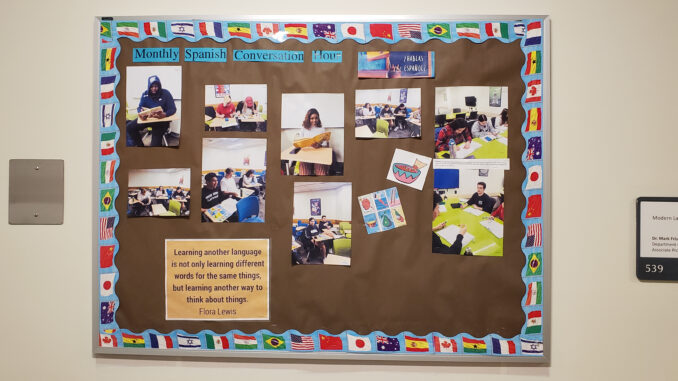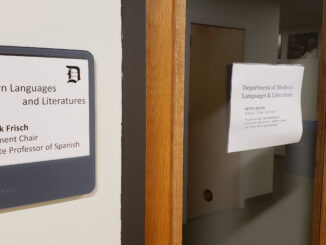
Kellen Stepler | features editor
Oct. 7, 2021
Spanish professor Lucia Osa-Melero said that during a faculty meeting last week, she and her colleagues were devastated by news that the provost’s office was “strongly thinking” of canceling the foreign language proficiency requirement for liberal arts majors.
“It was devastating for the morale,” Osa-Melero said. “The department felt so defeated by the end of that meeting.”
Osa-Melero said that in the Zoom meeting last week, Department of Modern Languages and Literatures faculty were told by the dean and associate dean that the foreign language proficiency requirement is affecting prospective students’ decisions to pursue an undergraduate degree in the liberal arts college.
“I don’t understand how it affects the recruiting negatively, but that’s what they told us,” she said.
Duquesne recently transitioned to a new core curriculum called Bridges, which no longer includes any foreign language requirement.
Gabe Welsch, a spokesperson for the university, said despite the change, individual departments in the McAnulty College of Liberal Arts can still require some foreign language proficiency if they choose.
Further, he said that students currently enrolled in foreign languages can “persist” finishing the proficiency requirement if they choose. It is up to individual departments to determine which majors require the 202 foreign language proficiency requirement.
“Advisors are prepared to coach students on their options,” he said.
However this decision did not sit well with Duquesne senior Alyson Huth. Huth said she was drawn to Duquesne for its emphasis on global cultures, so that she could pursue her studies while taking a foreign language. Huth, a senior French tutor, majors in both Public Relations and French – the latter of which she self-designed.
“One of the things that sets Duquesne apart from other universities is the fact that we put so much emphasis on global engagement, global awareness and modern languages in general,” Huth said in an interview with The Duke Monday.
In a petition Huth created on the platform change.org Monday afternoon, she wrote, “We are fighting to prove that languages are a valuable asset to a university education and to save the foreign language department by keeping the foreign language proficiency requirement, which is a defining feature of a Duquesne University liberal arts degree.”
As of Wednesday evening, the petition had 130 signatures. She also wrote letters to upper-level university administration protesting the move.
When Huth emailed Provost David Dausey Tuesday voicing her concerns, Associate Provost Darlene Weaver responded with a further explanation of Bridges.
“Bridges was created over a three-year process that involved hundreds of faculty, staff and students. One of the goals of our curriculum revision is to increase students’ flexibility. This includes eliminating prescriptive ‘cores within the core’ so that students are better able to tailor their elective requirements in keeping with their career aspirations and intellectual interests,” Weaver wrote in the email Huth shared with the Duke.
“I assure you that any student who wishes to take language courses, minor in a foreign language, or major in a foreign language can continue to do so. Moreover, departments in the college can retain a language proficiency requirement as an element within particular majors,” Weaver wrote to Huth.
Welsch did not answer a request seeking comment about the petition.
-What is going on in the Modern Languages department?-
The proficiency in a foreign language general education requirement traditionally takes a student four semesters to complete. However, students may take a placement exam to test into a more advanced level to achieve the 202 proficiency requirement, rather than starting at the 101 level.
The Department of Modern Languages and Literatures at Duquesne offers courses in six languages – Arabic, French, German, Italian, Japanese Culture and Spanish.
The “college core” that required the foreign language proficiency was exclusive to liberal arts degrees at Duquesne. However, with the implementation of the Bridges Common Learning Experience this semester, the “college core” and UCOR classes that all students take have merged into one for liberal arts students — thus, phasing out the UCOR curriculum.
Modern Languages and Literatures department chair Mark Frisch declined an interview Monday, citing the “fluid” nature of the situation. But former department chair Edith Krause, who retired in the spring, said that “there is a great lack of attention given to language learning in the U.S.”
“Duquesne has created the Bridges Curriculum,” Krause said. “Guiding students toward learning a foreign language is one of the best ways to encourage them to reach out and build bridges and pathways to the world around them—locally and globally.”
It is through the requirement that professors like Osa-Melero can recruit students into pursuing a Spanish minor. When she teaches Spanish 202, she can build a rapport with students and encourage them to pursue a Spanish minor. While the number fluctuates between languages, she estimated that about 70 students minor in Spanish.
“If the requirement is not there anymore, how am I going to meet the students to convince them to major or minor in Spanish?” she said. “What type of contact am I going to have with them to make them study more foreign languages?”
According to the department’s website, the department offers two Bachelor of Arts majors: a B.A. in Spanish, and a B.A. in Modern Languages. The department also offers minors in French and Spanish, according to the website.
‘A short-term fix that is only going to cause more problems’
Huth argues that the foreign language proficiency requirement “sets a Duquesne University degree apart from other universities.”
“By graduating from Duquesne, we graduate with knowledge of another language and culture, which is important when entering the job market,” she wrote to University President Ken Gormley Tuesday. “As I’ve started applying for jobs, I’ve found that knowing even part of another language gives me a step up above competitors and is a great talking point for interviews.”
She also believes that the decision to end the requirement “will actually cause more problems in the long run than it will fix in the short term.”
“Modern languages will be phased out causing class sizes to decrease,” she wrote. “This leads to canceling classes, then getting rid of languages, to eventually phasing out the entire modern languages department, which is overall a huge mistake to the university.”
Huth said that while the university might gain students who don’t want to take the requirement, it will also lose prospective students. In her experience, she chose Duquesne because it offered French.
If Duquesne eliminates the foreign language proficiency requirement, the university is directly going against its own emphasis on global awareness and global engagement, Huth said.
By its very definition, Osa-Melero said that learning foreign languages can be difficult: it’s foreign, but that is all the more reason to take those courses.
“You’re studying something that’s going to take you out of your comfort zone,” she said. “That is so important in a human being’s development. You need to get used to being out of your comfort zone.”
Osa-Melero said that there is more to learning a foreign language than the language itself.
“We don’t prepare the students only to speak a language, we prepare them to open their minds,” Osa-Melero said. “We show them that there are other cultures, over there, as valid as their culture, that are working and functioning, and then one day, if you take the plane and go somewhere else, you’re going to meet those cultures and you’ll be more prepared to be a global citizen.”
Carmen Martinez, who is an adjunct professor in the foreign languages department, also signed Huth’s petition. Martinez said that learning a foreign language is “one of the best things that you can do for yourself.”
“Learning a foreign language enhances your cognitive abilities, and specific intellectual skills such as critical thinking, writing ability, creative thinking and problem-solving skills,” she said.
In the era of language-learning apps like Duolingo or Babble, sophomore environmental science major Rosie Spinola said it’s “more sensible” to do an independent study in a language that a student chooses.
“I think there are better classes that we can require to have a more rounded education – like civics or scientific literacy,” she said. “Being proficient in French, German or Spanish will help you gain better insight into the rules of the English language, but it isn’t necessary in order to be prepared for a career in liberal arts.”
“Learning a language is like networking, the extent to which you use it in your career should be up to the discretion of the individual,” Spinola said.




